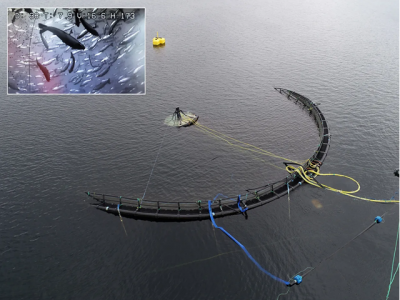Study backs benefits of submersible fish farms

Fish farm pens that can be submerged to avoid issues such as parasites and extreme weather conditions are proving their worth, although there are still some challenges to be overcome, according to a new study.
A number of submersible cages are commercially available, including Akva's Atlantis design. Photo: Akva
Published in Reviews in Aquaculture, the study - which was conducted in collaboration with the Institute of Marine Research and the University of Melbourne - shed light on potential production benefits and the challenges of using submerged cages for some fish species.
“Surface-based cages are the dominant production technology for marine finfish aquaculture; a rapidly growing industry, feeding millions each year and contributing billions to economies,” said lead researcher Dr Michael Sievers, of the Australian Rivers Institute in a press release.
“However, these surface pens are prone to net deformations and cage breakdowns from storms and extreme weather, they can have outbreaks of parasites and diseases, and suffer from poor environmental conditions such as high temperatures and low oxygen levels.”
“Research and innovation in submerged cage technology over the past few decades suggest that sinking the cages deeper in the water offers a promising alternative that may reduce many of these problems, with several companies already trialling this approach.”
If submerged fish farming is to be a viable alternative to surface cages, we need to gain a greater understanding of how to use the advantageous environmental conditions below the surface to improve fish growth and welfare over the commercial production cycle
“For instance, salmon lice that wreak havoc in many salmon-producing countries are abundant in surface waters, so submersing cages reduces the prevalence of these parasites on fish.”
“Submerging cages also unlocks new production areas where surface-based cages are inappropriate due to surface wind and waves, or space conflicts with other coastal users.”
Issues to be addressed
While submerged fish farming holds promise for reducing several issues that plague surface-based aquaculture, placing cages below the surface creates its own problems.
As Dr Sievers states, their critical evaluation of the literature and science of submerged aquaculture shows that not all fish species are equally suited to farming in cages below the water surface.
“Our findings suggest that while fish with closed swim bladders (or none at all) may be well-suited to submerged fish farming, for those like salmon with open swim bladders, it’s more complex as they need surface air to refill their bladders and maintain buoyancy.
“Without access to surface air for long periods, the health and growth of open swim bladder fish can be compromised, but new technological advances such as underwater air-domes in submerged cages can overcome this challenge.
“If submerged fish farming is to be a viable alternative to surface cages, we need to gain a greater understanding of how to use the advantageous environmental conditions below the surface to improve fish growth and welfare over the commercial production cycle. Our research is a step in this direction.”
Related news
 New Zealand scientists launch novel flounder farming breeding programme
New Zealand scientists launch novel flounder farming breeding programme Plans to investigate the possibility of farming yellowbelly flounder in land-based systems have been launched in New Zealand this month.
 Nutritional tool creators question the value of using fishmeal for animal feeds
Nutritional tool creators question the value of using fishmeal for animal feeds The use of fishmeal for aquafeeds has been questioned by the authors of a new database that contains nutritional data relating to over 500 fish species
 Why Brazil is emerging as a global tilapia farming contender
Why Brazil is emerging as a global tilapia farming contender Brazil is set to be the third largest tilapia producer in the world within the next decade, predicts Renato Morandi, production manager at GeneSeas.